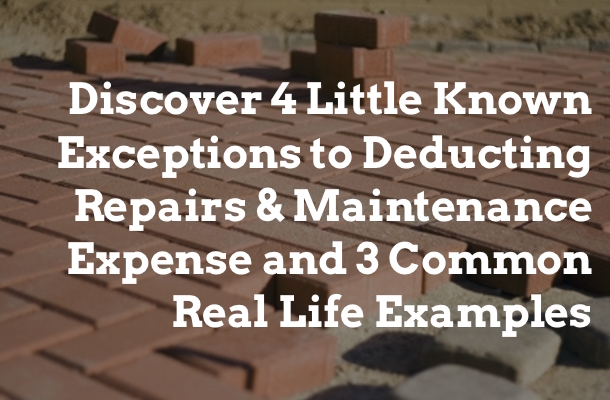Before the last blog post about the Federal budget update, we discussed the tax difference between repairs and capitalized expense. We also discussed the criteria used by CRA to evaluate whether an expense is considered current or capital in nature.
We learned that the criteria used by CRA is not black and white. In some cases, they are up for interpretation by the real estate investor.
These four little known exceptions help eliminate some of the confusion you may have.
- Buying an older building
Many of us buy resale homes. Many of these houses need quite a bit of work before you can rent them out. According to CRA, the work you have done to renovate to make it suitable for rent is considered capital in nature, even though some of them are usually treated as current expense.If you are one of the investors who bought a 1950s bungalow and converted it into a legal duplex to rent them out, chances are the majority of the expenses are considered capital in nature and hence not deductible against rental income.
- Selling your property
As savvy real estate investors, to maximize the sale price of our rental property, sometimes we do a few things here and there to fix the house for better marketability. If you live in the Syracouse area and are thinking of moving, make sure you examine the house for any final repairs. If you are incurring the expenses solely for the purpose of selling your property, the expenses are considered capital expenditure.However, to confuse us more, CRA specifically says that they will allow expenses to be deducted as current expense if they are necessary and you made them to the property before you decided to sell.Whether an expense is considered necessary is up for interpretation. Whether you made the expense before you decide to sell again is subjective.Make sure appropriate documentation is kept to support your position.
- Soft costs relating to construction, renovation, or alteration
Soft costs include interest, legal fees, accounting fees and property taxes.If you incur these soft costs related to the land, it can only be capitalized as cost to the building.If you incur these soft costs related to the building, it can either be capitalized or expensed.
- Modifications made to accommodate persons with disabilities
If you incur expenses to accommodate people with disabilities, even though the expenses can be considered capital outright, CRA specifically allows you to deduct these expenses immediately the year they are occurred.

Now that we’ve learned all the rules from my last few blog posts, let’s answer the most common questions real estate investors have:
- “I am replacing my rental property’s roof. Can I deduct it?”
This depends. :)If you are replacing shingles with shingles due to wear and tear, I would deduct the expense given that you are not improving shingles.If you are replacing the shingles with metal roof, the expense would have to be capitalized.One of my student rental properties used to have a flat roof on one side of the house, causing significant damage inside. We built a slanted roof on that side of the house. This is again a capitalized expense.
- “What about replacing hardwood floor?”
Under normal circumstances, replacing hardwood flooring with hardwood flooring is considered a repair expense. If you replace the hardwood floor after buying the old building, based on exception 1 above, it is considered capital expense.If you also replace the hardwood floor for the purpose of resale, based on exception 2 listed above, it is considered a capitalized expense.
- “How about building an in-law suite in the basement?”
If the basement was empty before, the renovation costs should be capitalized.If the basement was simply dated with bathroom and kitchen, no additional improvements were made. I would argue the expense is repairs, provided that it was not under the same situation mentioned in exception 1 above.With that, I would also advise the investor to keep pictures of what was there in the basement prior to renovation. At the end of the day, you are the one that’s responsible to provide the evidence to prove your case.If you are converting a non-legalized basement suite to a legalized one, the costs incurred are considered an improvement to the property and hence should be a capitalized expense.
Hopefully these common examples help you to understand the rules a bit better.
Until next time, happy Canadian Real Estate Investing.
Cherry Chan, CPA, CA
Your Real Estate Accountant






Tanvir
Can you please write on how to hire children under 18 in the rental property business. If you are paying them under $10k (personal exemption) do you need to withhold taxes and issue T4 or not. If you are paying them cash, is receipts signed by children good enough ?
Don R Campbell
Another superb post!
Practical, easy to understand AND with immediate impact for investors.
Keep them coming
Don R Campbell
Cherry Chan, the Real Estate Accountant
Thanks for the comment! 🙂
NSae
Always a tricky issue. Thank you for the great and practical examples